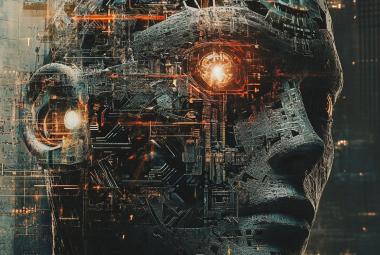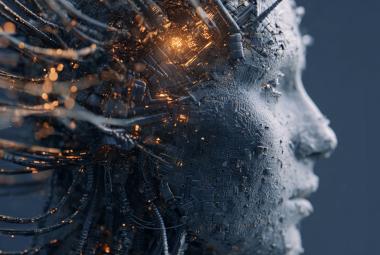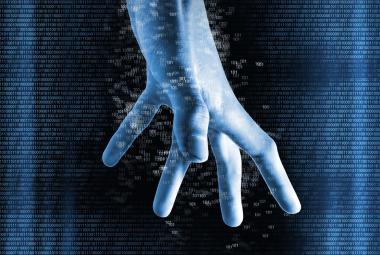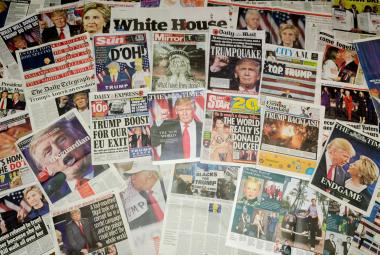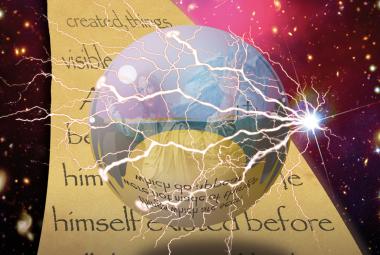An increasingly popular genre of entertainment - in both books and movies - is a form of science fiction that deals with one of the frontiers of the computer industry: virtual reality.
Playing off of the explorations being pursued at MIT's Media Laboratory, a popular excursion in current entertainment is to stipulate advances in technology - in both software and hardware - being applied to a "super computer game" in which an entire simulated world is created, with virtual people living virtual lives, etc.
(The Matrix and the far more provocative The Thirteenth Floor are current examples.)
The typical plot line involves experimenters transitioning to actually participate, for a time, in a simulated virtual world. Consciousness is recognized as simply a software aspect, not hardware.
Plot twists occur when the experimenters discover that their own "real" world is also someone else's simulation, and they, too, are virtual beings in a virtual world, etc. In The Thirteenth Floor, this even extends to a surprising additional level that challenges our conceptions of past, present, and future.
But What About Us?
Clever entertainment, but with a deeply provocative and disturbing suggestion: Is our own "reality" virtual? One implication of these conjectures is the insight that both our own behavior and even our "physical reality" can be viewed as simply software, a super-program running within a highly advanced environment.1 We know today that our physical world is, in a very real sense, a digital "simulation."
(Perhaps our earth is round to prevent our discovering a boundary condition restricting our own simulation limits?)
The field of biology has now discovered it is restricted by the boundary conditions of the information sciences. Its historical love affair with Darwinism is now being shattered by advances in microbiology, highlighted by the disturbing revelations of Michael Denton, Philip Johnson, and Michael Behe, et al., revealing biology's apparent immunity to truth and reason.2
But now the field of physics, too, is in turmoil. Quantum physics has resulted in the abandonment of causality, the cornerstone of empirical science. And whether we address the units of length, mass, or time, we discover that they are composed of indivisible units that ultimately cannot be divided without losing their "locality."3
The more one knows about particle physics and quantum mechanics, the more provocative these "science fiction" episodes become. Indeed, it was Dr. Albert Einstein that admitted,
People like us, who believe in physics, know that the distinction between the past, present, and the future is only a stubbornly persistent illusion.
And as physics goes, so too the entire field of cosmology. I believe it was Paul Davies who observed,
It is as if our entire universe is nothing more than a thought in the Mind of God.
The current genre of virtual reality films, while still retaining many of the moral deficiencies that have come to characterize the products of our entertainment industry, can still be provocative and useful in conceptualizing our present situation: we find ourselves in what can be accurately described as a digital simulation.
And transitions in and out of our space-time - from one "hyperspace" to another - is a potential rationalization of the more disturbing UFO reports and other apparent visits from dimensionalities other than our own.
It is also a way of conceptualizing the strangest transition of all: the harpazo, the "Great Snatch," which Paul alludes to in 1 Thessalonians 4:16-18 and 1 Corinthians 15:50-53.
(A "twinkling of an eye" is not to be confused with a blink; at the speed of light passing through the retina, it is about 10-43 seconds - the very digital boundary of time itself.)
The Ultimate Love Story
The very nature of our time dimension is but a small island in the sea of eternity. It is an experiment of sorts, designed to demonstrate Infinite Love: allowing man, endowed with autonomous free will, to get himself into a predicament from which he is powerless to extricate himself; and, from which only the death of the Designer Himself could suffice. Indeed, it is a love story, written in blood on a wooden cross erected in Judea almost two millennia ago...
The Ultimate Resolution
We have just enjoyed a season celebrating "giving." But a more profound aspect than "giving" is receiving: receiving the Ultimate Gift within our reality; the very gift that guarantees our successful transition to that ultimate reality, the perpetual and comprehensive fellowship with our Designer.
Have you discovered that Ultimate Gift? If you haven't yet, the most exciting adventure imaginable lies just ahead.
If you have received that Ultimate Gift, what have you done with it?
Notes:
- A radical molecule-sized computer switch has just been announced at the International Electronic Device Meeting in Washington, D.C. on Dec. 6. It was reported in the Nov. 19, 1999 issue of Science, "Large On-Off Ratios and Negative Differential Resistance in a Molecular Electronic Device," by graduate student Jia Chen and professor Mark Reed of Yale University, and graduate student Adam Rawlett and James Tour, the Chao Professor of Chemistry of Rice University.
- Michael Denton, Evolution: A Theory in Crisis, Adler & Adler, Bethesda MD, 1985; Philip E. Johnson, Darwin on Trial, InterVarsity Press, Downers Grove IL, 1991; also, Reason in the Balance, InterVarsity Press, 1995; Michael J. Behe, Darwin's Black Box, Simon & Schuster, New York NY, 1996.
- For an exploration of the Biblical implications of quantum physics, see our Briefing Package, Beyond Perception, on page 37 of this issue; also, Chapter 23, "Our Digital Universe," in the section on "Metacodes" in our book, Cosmic Codes - Hidden Messages From the Edge of Eternity, Koinonia House, 1999, pages 333-346.

